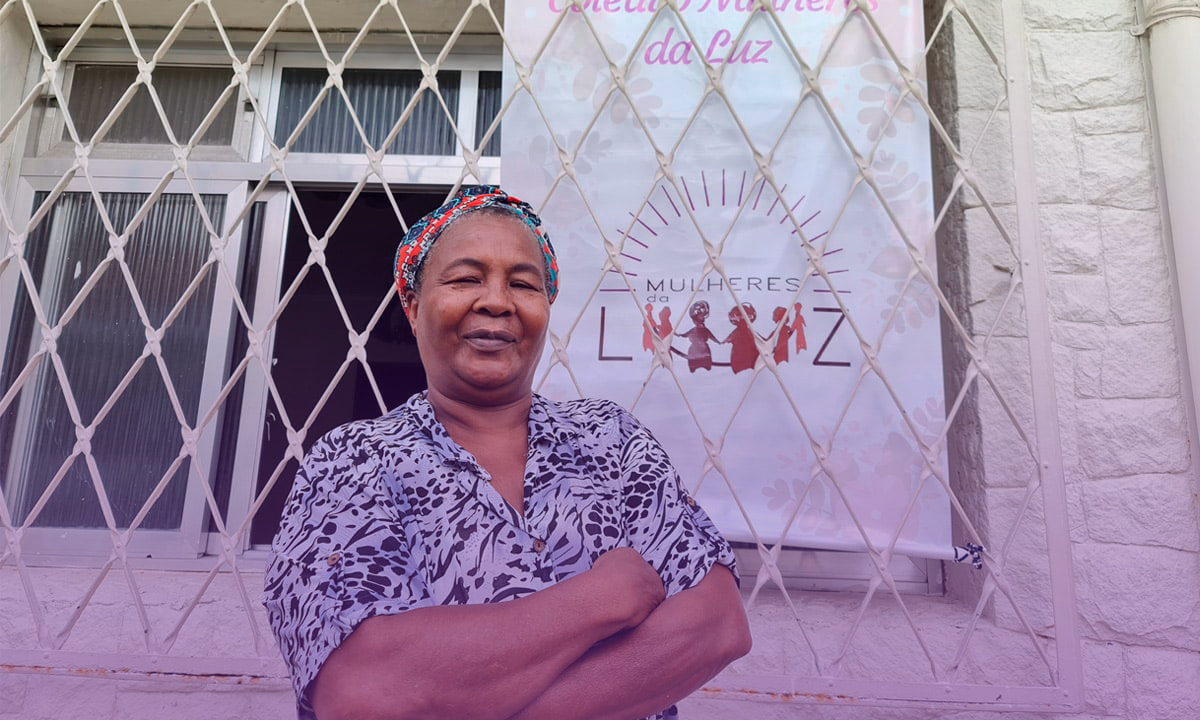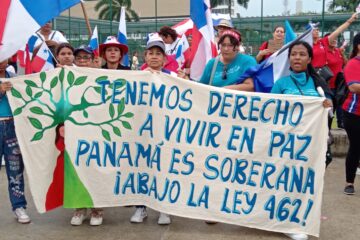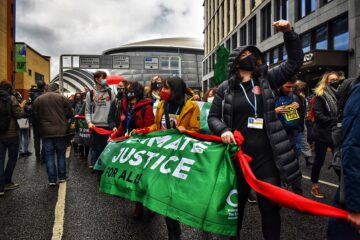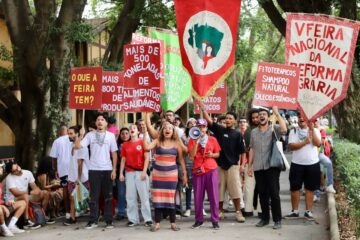Cleone Santos (1957-2023) was an unstoppable feminist militant. Her personal and political stories intertwine, as she was a member of the housing and unemployed workers’ movements in the metropolitan area of São Paulo (known as ABC area), before joining the feminist movement, where she continued to struggle throughout her life. Cleone was a member of the World March of Women in Brazil, and she strongly contributed to formulating a critical view of prostitution, from the point of view of the resistance exercised by Black and poor women.
Cleone was in prostitution for 18 years and was able to survive it. But she remained in Parque da Luz in downtown São Paulo, working with nearly 500 women who are still in prostitution in the area. Her project started with a “library bike” that lent books to the women at the park—most women are Black, over 40, and live on the outskirts of São Paulo. She founded Women of Luz [Mulheres da Luz], organizing different forms of intake, support, and organization, aiming to get public policies to reach women in prostitution. In 2021, she took office as the coordinator of Public Policies for Women in the city of Diadema.
From readers to authors. Cleone always made sure to promote the stories of most women in prostitution, as a strategy to challenge the glamorized notion that hegemonizes the debate around regulating prostitution in Brazil. In recent years, she collectively organized and published the book Life Stories: Women of Luz [Trajetórias de vida: Mulheres da Luz], with nine accounts, including hers. We publish below excerpts from her account, originally recorded by the feminist researcher Mariana Afonso.
Her outlook, her voice, and her way of perceiving and approaching often controversial issues related to the lives of women in prostitution have influenced different generations of the World March of Women militants in Brazil. We share some of Cleone’s story and reflections, as told by herself, in the video below. And we invite everyone to learn and keep alive the story of this sister who was a fortress: rebellious, unsubmissive, solidary, revolutionary.

When I first got here in the streets, I brought that militant thing with me, you know? I’d see a woman with a problem and I’d try to find, with her, a solution for that problem, to build something. And I was there, in prostitution. And that went on for years. Someone had an issue that required a lawyer, and I would say, “come on, let’s talk to that lawyer.” If someone needed a doctor? “Let’s go!”
I always thought to myself, “Once I leave here, I will not want to have anything to do with it anymore, no way!” But it was actually the other way around. By the time I stopped, I dove deeper into this story. Everyday I ask myself why haven’t left for good.
But I know why. Because these are people that hardly anyone gets closer to. They are treated as the scum of the underworld. They are not respected, not even in the underworld… And someone has to do something. Someone has to be there, together. And that someone cannot be coming from the outside saying “poor things.” We know no one is a poor thing here. But we also know they are there because society has not worked for them. So we have to be there!
I think we will always be a very shy group, you know? Because the population that is part of it does not want to be exposed. So it will always be a very shy group, but they have to exist. If this group does not exist, things can get a lot worse, right? That is why I stayed.

What do we see out there? People glamourizing prostitution. But you don’t see anyone struggling for public policies for women so that they don’t get into prostitution. Or looking to include women in public policies, you also don’t see that. All you see is people looking at the easier part—the people who make a lot of money—and they think it’s all glamorous… But actually it is not.
Some people say the bad side of prostitution is the guilt thing, the moral values, and, if it weren’t for that, it would be ok. I don’t think that’s the only thing. It is a lot of things. In addition to guilt and moral issues, there is also the matter of our health—which is very serious. The mental stress is tremendous!
I know how prostitution has psychologically damaged my life. To this day, I walk into some places and fear people may come to me and say they know me, you know? I have no reason to fear that now. It is one of those damages.

I never saw prostitution as work. I have always seen prostitution as a situation in which we get into and want to leave tomorrow. And it’s not like that. We think, “I’ll do it today, and tomorrow I won’t do it anymore.” But actually, it feels like we get into a web that sucks us into it, wraps us into it. When we are in it, we start to run up debts. We see the money coming in. So much so that I finished paying for my plot of land, I built my home, I paid people to take care of my children, I paid for the van to get them from school. We managed to live a middle class life. But also, it was money we would spend every day, you know? When it was time to pay off debts, I’d get desperate.

There is always someone trying to pimp you, always a trickster, you know?! As soon as I got here, for example, a trickster came along. Some guy I started dating—in my mind, I was dating him. We get so vulnerable that, when someone comes and is tender, he becomes your boyfriend, you know? Then suddenly I started to notice, “Honey, can I borrow ten, can I borrow five, can I borrow…?” And he would never pay me back, you know? (…) So one day I said no. And he told me, “You’re going to give it to me or I’ll break you!” I looked at him and said, “I don’t have it!” but I did. He knew I had it and he said he would break me. I walked toward the escalator. When I got to the escalator, he came close to me, and I pushed him. I didn’t think twice, I pushed him down the escalator! Never again, I’ve never seen that man again! (…) But this problem, people who want to extort you, always comes up. This is the place of extortion. They are subtle, and when you realize, you are providing for them and you don’t know how.
It’s as if prostitution “made us stupid.” We start to only think about making money. You don’t think about anything else. And then these things start to happen. We start to fail to take care of ourselves, or to take care of ourselves for others, thinking about making money. We have no time for anything, for family, for reading, not even a little bit. We close ourselves off, more, and more, and more, until it is all your brain can think about. This is why I say it makes us stupid, because we don’t think about anything else.
There is this trending rhetoric about “empowerment,” autonomy… But I don’t see it like that. How can it be our decision, when it’s the guy that comes, pays up, sees us as an object, you know? And he uses us. So it’s not our decision. We become an object for the guy. When these people say that, I don’t believe they really think that.
(…) I really think people say “it was cool” because that’s what they wanted it to be, you know? I never said I liked it. I always said, “I’m here, but eventually I will find a way out. I was not born into this shit!” And I was constantly arguing with myself, you know?
How could I be happy, if I could never tell? I was always hiding, hiding in shame. You know, maybe I still feel some shame today. Because if I didn’t, I would not find it so hard when someone calls me to take part in a debate for a broad audience, where there will be press. I only go to this kind of thing because I have to. I go because I know there will be people there in front of me supporting me. If it was something smaller, I don’t know if I would have the courage. Because we do feel shame. Do we have to sell our bodies to survive? We feel so much shame. Gosh! I dreaded the possibility of my family knowing… So much so that they learned about it—but not because I said, “Come here, I’m going to tell you something.” No! They learned about it because I was working for the Pastoral Commission for Marginalized Women and I wrote something. And that writing was me.

That’s it, for me, it was never work. It was this crazy thing I got into and couldn’t leave at first. I just got myself deeper and deeper into it. But, like I said, prostitution makes you stupid. The money would come… But now, that type of thing doesn’t happen. (…) Ok, that was the money with which I finished paying my plot and built my house. I helped a lot of people in my family. But still, I’d say that, to me… Was it an experience? Yes. But it was not the best experience, no. And not even one of the best! It was the worst experience I have ever had. It left a lot of scars.
Prostitution stigmatizes us. Not only it stigmatizes us from the outside—we stigmatize ourselves too, you know? You can overcome a bad situation at a job. But prostitution is something that stays with you for life, and as a bad thing. For example, I’ve had bad experiences working in companies, and they were terrible at the time! But now I can laugh about them. But I could never laugh about the bad things I’ve experienced in prostitution. Because they always get to me. It hurts! It hurts, you know? So I think prostitution is… I don’t know, I don’t even know what prostitution is. I know prostitution is something that, if I could, I would stop people from going through it. That’s it.

To me, being a woman today is carrying two pianos and a cow. And you have nowhere to put the piano. It’s there, look, balancing things. Every passing day there are more things, more things… Being a woman is being there in society, in a continuous power struggle. If only that would happen just outside—but we get home, and things are the same, you know? It’s a power struggle… Being a woman is spending eight hours out and then having to take another eight hours solving problems at home. Being a woman is being a mother and not being able to live with your child in everyday life, because you have to hustle to survive. I think that being a woman today is carrying burdens and burdens. And being a Black working woman makes it all twice as hard.
What gives me strength to not give up is to dream, dream, dream! Sometimes people think we are a little crazy, but it’s those dreams that make us do great things. Or small things, that add up and become a whole and become a better world.




